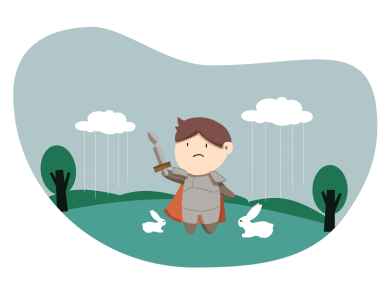
- GRIP Learning's Team
How you feel about yourself affects every aspect of it. Today you'll learn more about self-esteem and how you can build it!
Let’s talk about what self-esteem is, its importance and benefits, and the signs of low self-esteem in children.
Your child’s self-esteem is their belief in themselves and their abilities as a person.
At some point in their lives, every child will experience difficulties, peer pressure, or new situations that cause them to question their own value or self-confidence. There will be happy times and sad times in a kid’s life. From time to time, they will experience low moods.
A child’s sense of security, love, and ability to overcome challenges are all crucial to their development. Personal strength and pride can be bolstered through such adventures. A child’s intelligence, confidence, and sense of self-esteem can flourish when they develop the ability to plan for the future, make sound choices, and own the consequences of their actions.
A job well done is the result of deliberate planning, acceptance of responsibility, and persistence in the face of obstacles. The ability to visualize and recognize success is essential for a child’s development.
Let’s pretend for a second that your kid has a quiz on 10 spelling words this Friday, and doing well means getting all 10 correct. Parents who encourage their children to strive toward a worthy goal like this are wise. After establishing a reasonable goal, making an effort to complete the task, and discovering a measurable result, the child can take pride in his or her accomplishment and feel better about spelling. A possible self-statement is, “I am a hard worker, and I do my best even when it is difficult.”

How you feel about yourself, how driven you are to succeed, and how precious you are to yourself all contribute to your self-esteem. Children learn early on how to feel about themselves based on what their caregivers say and do.
Adults in a child’s life, such as parents, teachers, and friends, can have a significant impact on how they feel about themselves. Kids are more likely to have healthy self-images if they experience a lot of love and acceptance.
However, if they receive harsh or constant criticism, or if they are otherwise unsupported or neglected, their sense of self-worth is likely to decline. Anxiety, depression, and poor academic performance are just some of the outcomes of having a low perspective of oneself.
Helping kids achieve a healthy sense of self-esteem is crucial to their success in school and later in life.
Children who have a healthy sense of self-worth are better able to bounce back from temporary setbacks and continue striving for their goals.
2. Good decision-making
Those who value themselves highly are able to think critically and courageously try out novel perspectives.
3. Identifying and cultivating positive role models among peers
Children who have a healthy sense of self-esteem have an easier time identifying and cultivating positive role models among their peers and nurturing supportive friendships.
4. Overcoming Peer Pressure
People who value themselves highly are better able to connect with others, maintain meaningful relationships, and resist the pressures of their peers. They are less likely to give in to peer pressure and engage in harmful behaviors like binge drinking, drug use, or indiscipline because of their positive body image.
5. Standing up for themselves
Children who have a strong sense of self-esteem are not afraid to take a stand for what they believe in, even if it goes against the grain of society at large
6. Create a positive sense of self
Teenagers have the opportunity to begin developing a strong sense of self and authentic identity as they mature. This process makes them think about who they are, what they value, and what their life goals are.
7. Having protective patterns for the teenage years
Teenagers have a tendency to focus on themselves and their problems, and they may not be able to see things objectively. Having confidence in oneself during the teenage years can prevent problems later on. Your child is much more likely to feel confident in themselves, their abilities, and their accomplishments even while going through the normal challenges of childhood.
8. Obtaining a better performance
Optimists tend to overestimate their abilities and achieve more than they actually do. Having a confident perspective encourages them to try new things, put in extra work, and not give up, all of which ultimately result in them reaching their full potential.
9. Defining positive attributions
Young people who attribute their achievements to their own efforts are more likely to view failures as temporary and manageable. They have the capacity to view setbacks as temporary rather than permanent indicators of intrinsic deficiencies in themselves. They have a more realistic view of themselves as imperfect individuals who have the potential to achieve great things when they put their minds to it.
10. Freedom to fail
When you have healthy levels of self-worth, you give yourself permission to make mistakes. It’s been called “falling forward” by some. True achievement in life is impossible without encountering some setbacks along the way. All children need to be free to discover what they enjoy and make some mistakes along the way without worrying about the consequences. Instill in your child an appreciation for the opportunities presented by setbacks and difficulties. When faced with adversity, even the youngest children can usually see the benefits that lie beneath the surface. Children who have a solid sense of their own value can take what they’ve learned from an experience and move on to the next thing without feeling any regret.
Self-esteem can and does fluctuate, and this is perfectly normal in children. Preschoolers and toddlers typically have a healthy sense of self-esteem. You could hear them saying things like, “I’m the fastest runner in the universe!” This sort of behavior is typical of young children. As kids get older, they tend to compare their own worth to that of their peers. If their expectations aren’t met, they may feel like they’re not good enough or have low self-esteem.
1. Giving in to peer pressure:
Children with low self-esteem are more likely to give in to the temptations of their peers and engage in risky behaviors like drinking, using drugs, and skipping school.
2. Bad decision-making:
Those children with low self-esteem are more likely to make decisions that are ultimately harmful, such as those that involve self-harm, drug use, or eating disorders.
3. Severely criticizing themselves:
Children with low self-esteem often engage in excessive self-criticism, which can manifest as statements like “I’m the dumbest person in this class” or “everybody knows I am horrible at math.”
4. Unfair comparisons:
Children who have low self-esteem may compare themselves unfavorably to peers who are more skilled in a given sport or activity because they have been practicing it longer. They may begin a new activity with the complaint that the other children are superior at soccer, singing, or playing the violin. Your kid might be right, but he or she is overlooking the fact that those kids had to work really hard to get where they are.
5. Lack of self-reliance:
Kids with low self-esteem often want their parents to take the easy way out. They may ask their parents for help with homework even if they already know the material. Children who wait for adults to take the lead often develop a low sense of independence and confidence.
6. Negative self-evaluations and statements:
Children who struggle with their own self-esteem may frequently criticize themselves. People with low self-esteem may make statements like, “I’m the worst,” “No one cares about me,” or “Everyone knows I’m the worst reader in the class.” Young children frequently have unrealistic expectations of themselves or others and engage in unfair comparisons. To rebut this, it is best to ask questions like, “How do you know for sure?” or, “Is that a proven fact?” And maybe they’ll realize that their doubt was unfounded.
7. Negative self-fulfilling prophecies:
Children who already suffer from low self-esteem may be exposed to even more damaging influences. Unfortunately, some of these critical internal dialogues become self-fulfilling stories. Some people may say things like, “See, I am terrible at math. I know I won’t receive a good grade.” They expect to fail, put in the insufficient effort, and ultimately do so. These negative thoughts and beliefs can have a devastating effect on one’s sense of self-esteem.
It’s impossible to find two children exactly alike. Each child is unique, and it is your job as parents and educators to recognize this. One of the most important things you can do as parents or educators is to help kids learn to take responsibility for their actions, so they don’t end up being their own worst enemies. We could all benefit from training in self-reliance and coping mechanisms.




